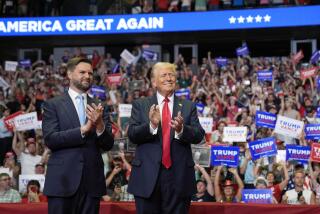State Dept. Eased Deals for Halliburton
WASHINGTON — U.S. diplomats in Asia and Africa worked aggressively to help oil-services giant Halliburton Co. secure lucrative overseas contracts when Republican vice presidential candidate Dick Cheney headed the company, according to State Department memos released Thursday.
In an Angolan oil deal, State Department officials there boasted in a cable to Secretary of State Madeleine Albright in 1998 that they had “literally camped out” at local government, banking and oil-industry offices, “unraveling snag after snag to obtain the transfer of funds” on behalf of Halliburton.
“The bottom line: thousands of America jobs and a foot in the door for Halliburton to win even bigger contracts,” the cable said.
Officials with the State Department said such liaisons on behalf of major U.S. companies are common and, indeed, encouraged under the Clinton administration’s push for a greater global presence in overseas markets.
But Democrats maintained that the assistance Halliburton received flies in the face of Cheney’s claim during the Oct. 5 vice presidential debate that “the government had absolutely nothing to do” with the wealth he achieved in the private sector as head of the company.
“The evidence is now clear that Dick Cheney is a hypocrite,” Mark D. Fabiani, deputy campaign director for Vice President Al Gore, said in an interview. “He not only relied on the government for contracts but he also used his government connections to win business. I know what he said during the debate before millions of people, and now we know it’s not true.”
With the election just 11 days away, Fabiani’s comments marked an escalation in the heated war of words between the two campaigns over Cheney’s business dealings, eliciting a sharp retort from the camp of Texas Gov. George W. Bush.
Responding to the Gore campaign’s criticism, Cheney spokeswoman Juleanna Glover Weiss said: “This is what you’d expect from a candidate who spent the last 24 years with little or no experience in the private sector.”
Cheney headed Halliburton from 1995 until he left in July to become Bush’s running mate, and the company saw its revenues grow quickly to $15 billion last year.
Cheney profited handsomely from his time there, leaving with a $34-million early retirement package. But his stewardship also has opened him to charges from Democrats that he is too close to the oil industry and that he used his connections as a former Defense secretary in the Bush administration to profit in the private sector.
His private sector experience has drawn even closer scrutiny in recent days.
The Times disclosed earlier this week that a subsidiary of Halliburton during Cheney’s tenure is under criminal investigation for allegedly defrauding the government out of millions of dollars in its work as prime contractor on the Ft. Ord military base closure.
And the New York Times reported Wednesday that Cheney made nearly $46,000 on stock investments in the summer of 1999--for an 80% return--by gaining access to nine initial public offerings for technology companies.
Fabiani said such business dealings should raise suspicions in voters’ minds. “The work of his company is now under federal grand jury investigation . . . and he received special treatment not available to average Americans when he got access to those initial public offerings,” he said.
But officials at Halliburton predicted that they will be exonerated of any wrongdoing in the Ft. Ord investigation. As for the initial public offerings, Cheney’s spokeswoman said he relied on no special access. “He had an account with [a San Francisco brokerage firm] and their dictate was to make money for their clients. That was all,” Glover Weiss said.
Nor did she see any conflict between Cheney’s comments regarding his self-made wealth and the disclosures of U.S. assistance overseas, Glover Weiss added.
The State Department cables, released to The Times under the Freedom of Information Act, show that U.S. overseas personnel worked aggressively and eagerly to help Halliburton overcome economic hurdles to gain access to markets in Angola, Bangladesh, Algeria, Russia, the United Arab Emirates, Oman and elsewhere.
In the Angola oil project, for instance, U.S. officials said that they had “worked systematically to remove the barriers” to financing Halliburton’s deal through the Export-Import Bank. Officials were able to help establish a special corporate structure for Halliburton’s work in the country that “may serve as a model for even greater export financing deals” being developed by other companies, the State Department cable said.
In Bangladesh, where Halliburton wanted to begin tapping a gas field in which it had a stake, U.S. officials lobbied on the company’s behalf with Bangladeshi officials.
And in Russia, a Halliburton executive met with U.S. Embassy officials in Moscow to mull ways to navigate the troubled Russian economy. If companies such as Halliburton could not work out financing schemes with Russian oil companies, they “risk being beaten to the punch when Russian companies are ready and able to start paying again,” one State Department cable warned.
The cables provide detailed insight into the workings of U.S. diplomatic efforts overseas, but State Department officials said the work done for Halliburton is not unusual.
More to Read
Get the L.A. Times Politics newsletter
Deeply reported insights into legislation, politics and policy from Sacramento, Washington and beyond. In your inbox three times per week.
You may occasionally receive promotional content from the Los Angeles Times.










